Short Speculative Fiction: An August Round-Up
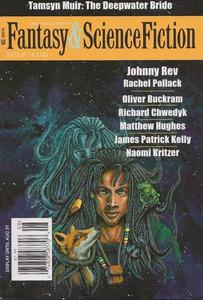 |
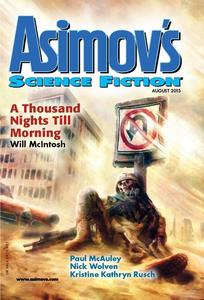 |
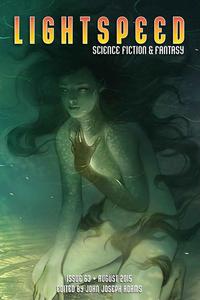 |
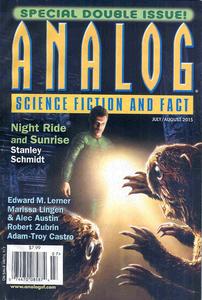 |
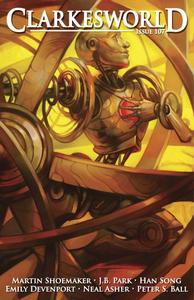 |
In this column, find recommendations for short speculative fiction from Fantasy and Science Fiction (July/August 2015), Asimov’s (August 2015), Lightspeed (August 2015), Analog (July/August 2015), and Clarkesworld (107). The Clarkesworld & Lightspeed stories are linked; the rest require a subscription.
“The Deepwater Bride”
by Tamsyn Muir
F&SF, July August 2015
This novelette meshes teen comedy with Lovecraft. That mash-up might sound awful. If I read that description in a review, I might be inclined to skip it. But don’t! This story is my favorite of the bunch I read this month.
Hester belongs to the Blake family, a line of seers. When dark oceanic forces rise in her town, she consults old journals and documents the horror as Blakes do.
Here’s where the tale gets interesting: as the world collapses, she gravitates towards McNuggets and smartphones and other teenage concerns. This shift could feel snide and smart-alecky, but instead it’s wistful. How should a young person deal with Fate? Why not meditate on how the bottom of the ocean has no Katy Perry?
It ends on a surprising emotional beat — which I’m honor-bound not to spoil. If you didn’t think Lovecraft and teen comedy could be stitched together, and somehow reach a satisfying and surprising and thoroughly awesome ending — then please check out this story!
“Caisson”
by Karl Bunker
Asimov’s, August 2015
I love historical speculative fiction. This tale transported me to 19th century New York City, where Polish immigrants travel deep beneath the surface of the river to build the Brooklyn Bridge.
We’re 43% of the way through the narrative before any speculative element shows up (though the engineering details may please science nerds). I won’t spoil what that speculative element is (it’s unexpected, and a bit implausible, but this story fully earns its gimmick by verisimilitude in every other respect).
What won me over long before the SF started was the characterization and details that make this tale live. We’re fully immersed in the perspective of young Dudek, and fascinated by his new friend Mischke (Mickey, as he’s called by non-Poles). I felt all kinds of emotions while reading this, and never knew what I’d feel next. As the world beneath the river grew stranger and stranger, I appreciated the humanity of this story more and more.
And there’s one kicker of a denouement! I heartily recommend this novelette.
“Dixon’s Road”
by Richard Chwedyk
F&SF, July/August 2015
How to write about this one? It’s the kind of fiction you want to put into a teacup and let steep for awhile, and sip slowly.
The basic concept (mild spoilers, I’ll cover what’s in maybe the first 30% of the story): A historian maintains the house of a poet who’s died long before. A visitor comes: her former lover, who’s still alive even all these years later, since cryogenic trips have rendered him an ancient anachronism existing in the present moment. Anachronism: the wrong word. Anachronisms aren’t so easy to explain in this world.
There are many things that appeal in this tale: the meditations on poetry, on great but tragic loves (with a host of classical references), the comparison between engineering and poetry, the world-building and terra-forming.
Yet, though I admire this story among the most of those covered in this column, something still seems off to me. We have the poet, Laura, and the engineer, Jim. And then there is Alice, the historian who tells the story. She’s an odd character, strangely confident. Jim is always trying to read her. And never quite succeeding. There’s an awkward moment when he looks at her and she’s the “penny under a magnifying glass.” Yet — for the story to be successful — it requires that Alice be just as compelling as the love story. And I can’t quite put my finger on her. If I ever manage to do so, I think this story will click even better than it does now.
In any case, well-worth reading.
“And We Were Left Darkling”
by Sarah Pinsker
Lightspeed, August 2015
A brief piece of 3,000 words, this short story has a dreamlike quality, which mirrors the logic of dreams: surreal in a way that makes sense. It fits into the world as we know it — but not quite. The protagonist, Jo, has super-vivid dreams she’s had a baby, and realizes hundreds of others have had the same dreams. Jo, though briefly sketched, seems to have a life that extends off the page, but only briefly — for it’s all washed away when the phantom children show up in the real world.
As to what the story means? It seems to have something to do with atypical motherhood, something to do with the social ostracization accompanying “delusions,” and something to do with a real scientific phenomenon that cannot be explained by reference to symbolism, but exists on its own terms (with powerful biological metaphors including the cuckoo). The story is a strange one, especially for the haunting admission near the end of the story: “I’m scared now.” Talk about being left in darkness…
Read it online here.
“The Narrative of More”
by Tom Greene
Analog, July/August 2015
This bleak tale deals with an anthropologist who reaches a planet with a strange variety of human. He struggles to understand their behavior through a process of experimentation and discovery which may please the anthropologically-minded reader. He also conducts a series of experiments in government, that play with political philosophy and the state of nature.
Most of the story’s pleasure comes in the slow revelation of the principles that underlie the species, and the history behind it. On second reading, I found myself faced with what seemed to be plot-holes (how do any of the babes-in-arms survive? is the sameness of the species truly plausible?), but for a short story, I found it a satisfying read.
(Incidentally I think it’s awesome that the scientist comes from Gnostica, and I’d be interested to see more stories set in this universe, whose forgotten varieties of far-flung and distant humans recalls LeGuin.)
“Security Check”
by Han Song
Clarkesworld, 107
This short story bored me at first — but if there’s ever a tale worth pushing past the beginning, this is it.
The beginning (a lot better the second time around) involves a New Yorker on subways that are heavily guarded. If you don’t walk through the guard technology, you get beaten to death. I had trouble believing that world. It seems like cliched dystopia, and to make matters worse, nearly all of the story focuses on world-building.
About halfway through the story, the scope changes dramatically when the main character moves to China. It’s at this point I realized that the subway system were just the introduction to the story, and the universe being built here by Han Song is far vaster and more ancient than I had imagined — and more surprising as well! (No spoilers, obviously, to get the details of the story you should go read it online.)
It’s the kind of story that manages to build a very compelling and unusual world in a short amount of time.
Read it online here.
“Paradise and Trout”
by Betsy James
F&SF, July/August 2015
I’m coming to the end of the tale, but I must briefly recommend this brief short story.
It’s about a young boy who’s just died, and his journey into the afterlife. His father gives him a series of instructions, tells him not to talk to demons, and sends him off to the afterlife.
The ensuing journey is charming, funny, scary, and unexpected. The main character is fun to spend time with. It’s a brief story, but it packs a lot in, and ends up feeling like a very old tale indeed.
Black Gate covers all the major fantasy magazines. Check out the Black Gate Mid-August Fantasy Magazine Rack here, and all our current magazine coverage — with updates on 30 ongoing publications — is here.
Learned Foote’s last article for us was Short Speculative Fiction: A July Roundup.
[…] Lots of great new magazines to read in September — and plenty of news to share. This month we start coverage of Mike Allen’s fine Mythic Delirium magazine, with the July-September issue (above), and Lynne and Michael Thomas take us behind the scenes to learn how the Uncanny Magazine podcast gets made. Clarkesworld mastermind Neil Clarke tell us the Sad Truth About Short Fiction Reviews, and Fantasy Scroll Magazine announced a massive collection of all 51 stories from their first year, Dragons, Droids and Doom, edited by Iulian Ionescu and Frederick. See our recommendations on the finest stories from last month here. […]